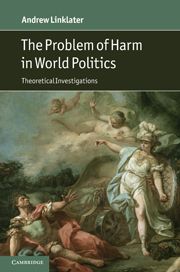Book contents
- Frontmatter
- Contents
- Preface
- Introduction
- 1 The concept of harm
- 2 The harm principle and global ethics
- 3 Harm and international relations theory
- 4 The sociology of civilizing processes
- 5 Historical sociology and world politics: structures, norms and emotions
- 6 Civilizing processes and international systems
- Conclusion
- Bibliography
- Index
5 - Historical sociology and world politics: structures, norms and emotions
Published online by Cambridge University Press: 05 June 2012
- Frontmatter
- Contents
- Preface
- Introduction
- 1 The concept of harm
- 2 The harm principle and global ethics
- 3 Harm and international relations theory
- 4 The sociology of civilizing processes
- 5 Historical sociology and world politics: structures, norms and emotions
- 6 Civilizing processes and international systems
- Conclusion
- Bibliography
- Index
Summary
The discussion now turns to the significance of the explanation of the civilizing process for recent efforts to build bridges between International Relations and historical sociology. Dissatisfaction with neo-realism – and specifically with its belief that the ‘propelling principles’ of relations between states have not changed for millennia – has provided the impetus for investments in linking the two fields. Critics of neo-realism have emphasized the differences between states-systems in at least two ways: by focusing on global normative frameworks that reflect the changing moral purposes of the state, or by tracing the impact of modes of production on the supposedly unchanging realm of world politics (Reus-Smit 1999; Rosenberg 1994). Those approaches demonstrate that efforts to forge new links between historical sociology and International Relations follow different pathways, some inclining towards analysing the ideational, and others the material, dimensions of human interaction. For reasons discussed in Chapter 4, a more complete account of world politics should aim for a higher level of synthesis that integrates those ‘levels of analysis’; and it should transcend them by considering domains that have been central to process sociology: namely developments in collective emotions that include attitudes to violence, cruelty, humiliation, exploitation and other ways of inflicting violent or non-violent harm on the members of other societies.
- Type
- Chapter
- Information
- The Problem of Harm in World PoliticsTheoretical Investigations, pp. 194 - 231Publisher: Cambridge University PressPrint publication year: 2011



